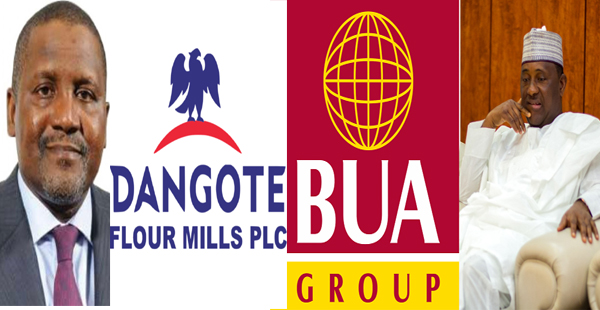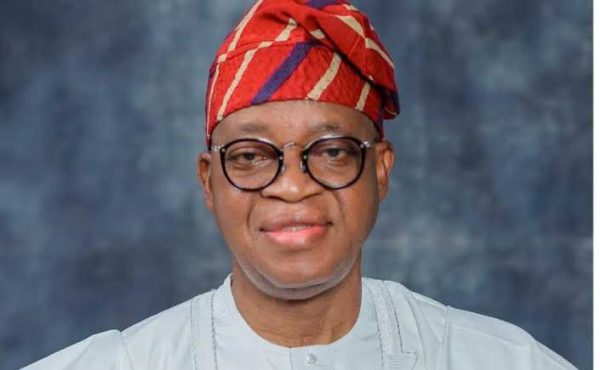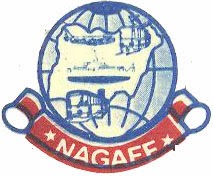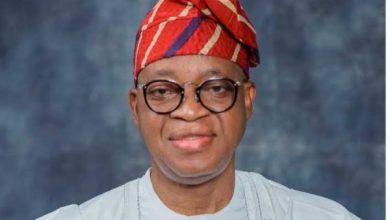Sugar War : Why Dangote, Flour Mills Fight BUA Group
. Dangote Refinery To Pay N120bn Customs Duty On PMS
· Stakeholders kick against monopoly
· Cabotage: Foreign ships enjoy over 90% NNPC oil supply jobs
By Kenneth Jukpor
As the actual reason Alhaji Aliko Dangote is leading the Nigerian Flour Mills to fight the BUA Group emerges, the Federal Government should earn N120 billion as duties to be collected by Nigeria Customs Service (NCS) on premium motor spirit (PMS) from Dangote Refinery sited at the Lekki Free Trade Zone(LFTZ) if the nation consumes the projected 10.4 million metric ton (Mt) of gasoline annually.
Nigerian National Petroleum Corporation (NNPC) currently purchases PMS at $610 per MT and petroleum products pay 5 percent customs duty on import, Dangote refinery will pay over $317 million to import its petrol to Nigeria if the nation would consume all its refined petrol.
This projection is based on the principles guiding companies operating in a Free Trade Zone, with Dangote Refinery sited in Lekki Free Trade Zone.
A free-trade zone (FTZ), also called foreign-trade zone, formerly free port, is an area within which goods may be landed, handled, manufactured or reconfigured, and re-exported without the intervention of the customs authorities.
However, when the goods are moved to consumers within the country in which the zone is located, they become subject to the prevailing customs duties.
The onus will be on the Nigerian government to collect duties from Dangote Refinery when the production takes effect for products to be consumed in the nation; meanwhile economic experts and oil and gas sector veterans expect that Dangote will enjoy some waivers in this regard.
During an exclusive chat with MMS Plus, a Governing Board member of the Nigerian Content Development and Monitoring Board, Mr. Mina Oforiokuma argued that Dangote Refinery could be exempted from import duty to access Nigerian markets on grounds that the crude is gotten from Nigeria.
Mina, who is also the Chief Executive Officer of Sopetro Marine Limited, opined that although FTZ is treated as a foreign area, the major product for the Dangote Refinery is Nigeria’s crude which isn’t imported but obtained from the country.
His words: “In Dangote’s case, the raw material utilized at the FTZ comes from Nigeria and this commodity didn’t enjoy free import as other products from foreign nations would have required. I believe that customs duties shouldn’t be applicable. On the other hand, customs duty might be applicable for the materials and other imported consumables required during the production process. However, this will make an interesting debate. Let’s see how it unfolds”
Meanwhile, the Director, Transport Research and Intelligence, Nigerian Institute of Transport Technology (NITT), Dr. Danjuma Ismaila disagreed with Mina, positing that Dangote Refinery should pay duties to access Nigeria’s market on the grounds that it is situated in an FTZ and enjoys privileges from such location.
However, he opined that the Federal Government might be willing to give the company some waivers as Dangote Refinery provides an opportunity to curb foreign imports of petroleum products and freight losses.
“Instead of importing petroleum products from other countries and paying huge freight, Nigeria would prefer patronizing Dangote Refinery and the company should pay Customs duties. However, I wouldn’t be surprised if Dangote gets some concession or waivers from the government on this. Government could create a special arrangement as part of efforts to support Dangote, otherwise the company would pay customs duties. It is also important to note that Dangote Refinery could export these products at zero duties and free from Nigerian regulations,” he said.
In a related development, port stakeholders and transport experts have condemned the technical ban on BUA Sugar refinery sited in the Port Harcourt Free Trade Zone.
The Federal Government prohibited the importation of refined sugar and its derivatives from the nation’s Free Trade Zones (FTZs), in a bid to protect the sugar industry, which is governed by the Nigerian Sugar Master Plan (NSMP).
The prohibition move, which came through a directive from the Minister,Federal Ministry of Industry, Trade and Investment, was conveyed in a letter by the Nigerian Ports Authority (NPA), Lagos Port Complex, Apapa, Lagos, sent to the Terminal operators of the Lagos Port Complex (LPC), Apapa, Lagos.
An NPA letter dated 08 April, 2021, and titled ‘RE: Prohibition of Importation of Sugar from the Free Trade Zones into the Nigerian Customs Territory’, was signed by Mr. Buba Jubril for the Port Manager, Lagos Port Complex.
Weeks earlier, Africa’s richest man and Chairman of Dangote Industries Limited, Alhaji Aliko Dangote, and the Chairman of Flour Mills of Nigeria Plc, Mr. John Coumantaros, said the establishment of a new sugar refinery plant in the country by BUA Group posed a threat to the attainment of the National Sugar Master Plan (NSMP) as well as sustainability of Nigeria’s local sugar industry.
They argued that the country currently has enough refining capacity to meet national demand. This move seems to have given credence to accusations that Dangote’s business strategy is monopolistic and kills the nation’s economy.
Recall that the United States of America (USA) recently alleged that the business strategies of the Dangote Group are dangerous to the Nigerian economy. It accused Dangote Group of blocking investment that the company may see as major competitors, stating that “Weighing everything in the balance, we believe the Dangote model is harmful to Nigerian and American interests in the long run.”
In a joint petition to the Minister of Industry, Trade and Investment, Chief Niyi Adebayo, dated January 28, 2021, the duo protested the recent commissioning of a sugar refinery in Port Harcourt, Rivers State, by BUA International, one of the operators in the sugar industry.
But in a swift response, Chairman of BUA Group, Alhaji Abdulsamad Rabiu, said the company took serious exception to what he described as the ludicrous claims by his two major competitors, pointing out that his sugar export-focused project in Port Harcourt, would not affect in any way, the backward integration programme, stressing that “the only way it will affect Nigerians is that Nigerians will pay lower prices for sugar.”
Speaking with MMS Plus on this, the Chairman of Nigerian Ports Consultative Council (PCC), Otunba Kunle Folarin said, “I don’t think the government can instruct BUA not to refine sugar for the Nigerian market. What should have happened is to ask BUA to make the necessary Customs duty payment for products it intends to sell in the Nigerian market.”
“While the regulation for a Free Trade Zone is clear as it focuses on export, are we saying companies in FTZ should be restricted to export only while the domestic market suffers? Every company in the FTZ has a right to change its policy from export to the local market as long as it meets the requirements which is payment of customs duties.”
Similarly, the NITT Director, Danjuma stated that BUA should be made to outline what percentage of its refined sugar is for the Nigerian market and pay duties and meet national obligations, while the product for export enjoys the privileges of a Free Trade Zone.
Noting that Free Trade Zones are normally created to boost trade by a government, create employment and earn foreign exchange, Danjuma added; “The idea is to finish manufacturing at the FTZ. When production is finalized at FTZ and the intention is to export, such company is free from national regulation and Customs duties on that product. In some cases such products could be contraband in the host nation and produced specifically for exports. However, if such products will be used in the FTZ nation, it will be subjected to existing national regulations and Customs control including charges.”
Nevertheless, the case of BUA Sugar Refinery in Port Harcourt is said to be peculiar because of the existing National Sugar Master Plan (NSMP) which seeks to boost indigenous participation in refining the product.
The argument is that BUA has an advantage if it imports refined products at zero duties into the FTZ and intends to service the Nigerian market. BUA would have to be subjected to the nation’s regulation on the product and Customs control which led to the ban.
Oforiokuma also posits that the ban on BUA from refining sugar could be monopolistic, arguing that the company should be allowed to do its business with clear requirements to service the Nigerian market.
The founding Member of Ships Owners Association of Nigeria (SOAN) also decried foreign dominance in oil supply jobs within Nigeria, lamenting that over 90 percent of the vessels engaged by NNPC are foreign owned.
However, it was gathered that Dangote and NFM protectionist action against BUA on the sugar refining controversy is not premised on the alleged derailment of the National Sugar Master Plan as claimed but their intention to retain the exclusivity granted them by Federal Government in 2015 as a favour for beefing up the campaign funds with N2billion donation.
“The Federal Government granted exclusivity to Dangote Sugar and NFM after the donation of N2billion to presidential campaign in 2015. The exclusivity was granted in his(Dangote’s) favour and he started building a sugar refinery in Port Harcourt and importing crude sugar without having a backward integration plan as required for new entrants. Exclusivities are legitimate and guarantee investments by pioneers. This is where the problem started. Why should the Federal Government decide to unilaterally change the rules in the middle of the game?” The source, who wanted anonymity, narrated.








